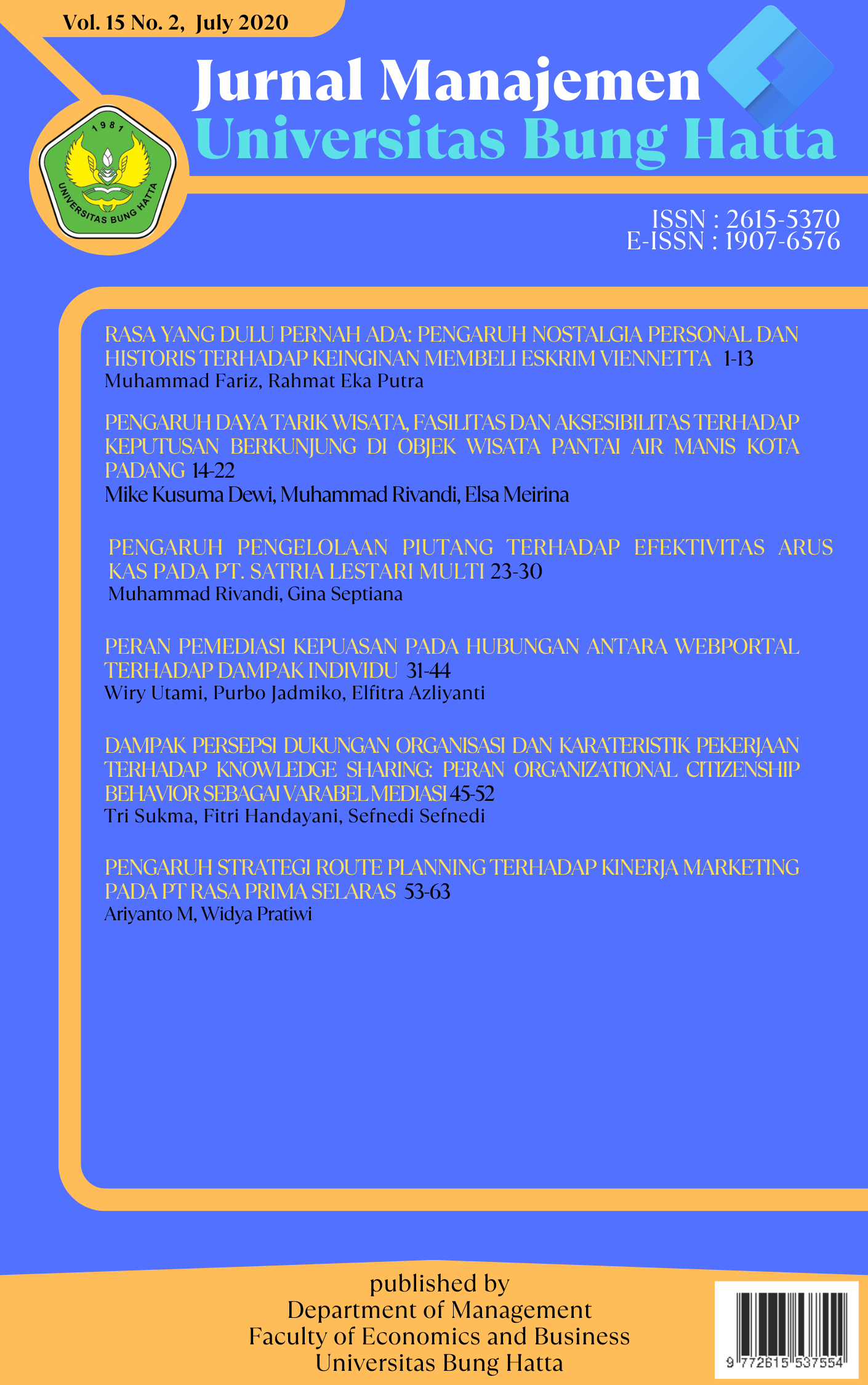DAMPAK PERSEPSI DUKUNGAN ORGANISASI DAN KARATERISTIK PEKERJAAN TERHADAP KNOWLEDGE SHARING: PERAN ORGANIZATIONAL CITIZENSHIP BEHAVIOR SEBAGAI VARABEL MEDIASI
DOI:
https://doi.org/10.37301/jmubh.v15i2.16901Abstract
Organizational citizenship behavior has been recognized as an important variable for every organization both in academicians and practitioners. The purpose of this study is to investigate the role of organizatinal citizenship behavior as mediator on the relationship between perceived organizational support, job characteritics and knowledge sharing. The number of respondents in this study was 37 employees of the Civil Servants in the Public Works and Public Housing Agency of the West Sumatra Region of Padang City. The results of analysis revealed that perceived organizational support and job characteristics did not affect directly knowledge sharing. However, perceived organizational support was found to have positive effect on organizational citizenship behavior while job characteristics did not influence organizational citizenship behavior. Furthermore, organizational citizenship behavior was found to have positive effect on knowledge sharing. In addition, organizational citizenship behavior was proven to mediate the relationship between perceived organizational support and knowledge sharing. However, it did not mediate the relationship between job characteristics and knowledge sharing.
References
Bagozzi, R. P., dan Yi, Y. (1988). On The Evaluation of Structural Equation Models. Journal of the Academy of Marketing Science, 16, 74–94.
Bartol, K. M., dan Srivastava, A. (2009). Encouraging knowledge sharing: The role of organizational reward systems. Journal of Leadership & Organizational Studies, 9, 64 - 76.
Constant, D., Kiesler, S.,dan Sproull, L. (1994).What’s mine is ours, or is it? A study of attitudes about information sharing, Information Systems Research, Vol. 5 No. 4, pp. 400-21.
Darcy, Colette.,Hill,Jimmy., McCabe, TJ.,Mc Govern, Philip.(2014). AConsideration of Organizational Sustainability inthe SMEContext. European Journa lof Training and Development, Vol.38 Iss 5, 398–414.
Davenport, Thomas.,dan Laurence Prusak. (2000). Working Knowledge. Boston: Harvard Business Schools Press.
Eisenberger, R., Huntington, R., Hutchison, S. dan Sowa, D. (1986), “Perceived organizational support”, Journal of Applied Psychology, Vol. 71 No. 3, pp. 500-507.
Fornell, C., dan Larcker, D. F. (1981). Evaluating Structural Equation Models with Unobservable Variables and Measurement Error. Journal of Marketing Research, 18 (1), 3950.
Hair, Joseph F, Jr dkk.(2014). A Primer On Partial Least Square Structural Equation Modeeling (PLS SEM). Sage Publication Inc. California USA.
Huadong Yang, Monique B. van Rijn., dan Karin Sanders (2018): Perceived organizational support and knowledge sharing : employees’ self-construal matters, The International Journal of Human Resource Management,
doi: 10.1080/09585192.2018.1443956
Ipe, M. (2003). Knowledge sharing in organizations: A conceptual framework. Human Resource Development Review, 2, 337-359.
Konovsky, M. A., dan Pugh, S. D. (1994). Citizenship behavior and social exchange.Academy of Management Journal, 37, 656-669.
Lam, A. dan Lambermont-Ford, J.P. (2010). Knowledge sharing in organisational contexts: a motivation-based perspective, Journal of Knowledge Management, Vol. 14 No. 1, pp. 51-66.
Pack, (2005). Antecedents and consequences of perceived organizational support for NCAA athletic administrators. (Doctoral dissertation, The Ohio State University).
Pei-Lee Teh Hongyi Sun. (2012).Knowledge sharing, job attitudes and organisational citizenship behavior. Industrial Management & Data Systems, Vol. 112 Iss 1 pp. 64 – 82
Qasim Ali Nisar, Anam Marwa, Umair Ahmad., dan Sajjad Ahmad, (2014) “Impact of Perceived Organizational Support on Organizational Citizenship Behavior: Empirical Evidence from Pakistan”, International Journal of Research (IJR) Vol-1, Issue-5, June 2014 ISSN 2348-6848
Rahmad Rizki., dan Mahdani Ibrahim, (2016). Pengaruh Karakteristik Pekerjaan Terhadap Motivasi Intrinsik Untuk Berbagi Pengetahuan Secara Online Dengan Menggunakan Affective Commitment Sebagai Mediasi Pada Karyawan PT Pertamina (Persero) Aceh. Jurnal Ilmiah Mahasiswa Ekonomi Manajemen Vol. 3, No. 1 Februari:105-116.
Sangkala. (2007). Knowledge Management. Jakarta : PT Rajagrafindo Persada.
Sefnedi. (2019). The Impact of Service Quality on Banking Customer Loyalty: The Role of Satisfaction and Switching Costs as Mediator. e-Jurnal Apresiasi Ekonomi. Volume 7, Nomor 1, Januari 2019: 1 – 8.
Sefnedi, Akmal., dan Nelva Sasmita (2020). The Mediating Effect of Patient Satisfaction on The Relationship between Service Quality, Hospital Image, Trust and Patient Loyalty: Evidence from Indonesia. International Journal of Research Science & Management 7(2): February, 2020
Syahri, Samirudin., dan Yasir (2013). “Mediation Effect of OCB on Relationship between Job Attitudes and Knowledge Sharing Behavior”, International Journal of Scienceand Research (IJSR).
Tesavrita dan Suryadi, (2016). Organization Learning through Effective Knowledge Sharing in SME’s:A Conceptual Model. IEEE International Conference on Management of innovation and technology (ICMIT), 203 – 207.
Downloads
Published
Issue
Section
License
Copyright (c) 2020 Tri Sukma, Fitri Handayani, Sefnedi Sefnedi

This work is licensed under a Creative Commons Attribution-ShareAlike 4.0 International License.
Authors who publish with Jurnal Manajemen Universitas Bung Hatta agree to the following terms:
- Authors retain copyright and grant the journal right of first publication with the work simultaneously licensed under a Creative Creative Commons Attribution-ShareAlike 4.0 International License that allows others to share the work with an acknowledgement of the work's authorship and initial publication in Jurnal Manajemen Universitas Bung Hatta.
- The author holds the copyright of the submitted and published articles, with the understanding that articles are disseminated under the Creative Commons Attribution-ShareAlike 4.0 International License..
- The editor team is entitled to do the editing in accordance with the guidelines for writing or template in the Jurnal Manajemen Universitas Bung Hatta.
This work is licensed under a Creative Commons Attribution-ShareAlike 4.0 International License.












